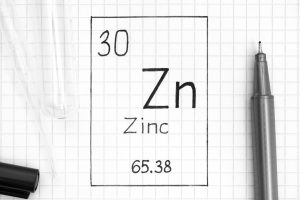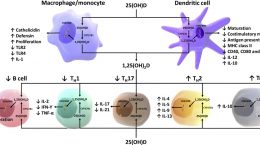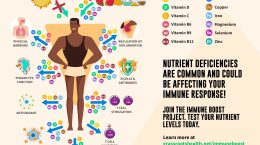Published on November 12, 2021
An estimated two billion people world-wide are deficient in zinc, an element essential for immune health, central nervous system function, growth and reproduction, and much more – how to tell if you are getting enough
Key Points
- Zinc is needed by an estimated 3000 proteins and enzymes to function properly, and is necessary for nutrient metabolism, DNA and protein synthesis, immune system functioning, cell division, reproduction and fetal development, wound healing, sense of smell and taste, central nervous system function, and much more
- Digestive issues, chronic liver disease, chronic renal disease, diabetes, and other chronic illnesses, low intake (such as with vegetarians and vegan diets), chronic alcohol intake, and increased intake of calcium and phosphate can increase the risk of zinc deficiency
- With nearly two billion people worldwide affected by zinc deficiency, measuring levels is an easy way to make sure you are getting and absorbing enough
 Today’s post and video below addresses many frequently asked questions about zinc, including why zinc is essential to our health, what happens when we are deficient, signs and symptoms to look for, causes of deficiency, food sources of zinc, and more.
Today’s post and video below addresses many frequently asked questions about zinc, including why zinc is essential to our health, what happens when we are deficient, signs and symptoms to look for, causes of deficiency, food sources of zinc, and more.
Did you know, an estimated two billion people worldwide are affected by zinc deficiency? While severe zinc deficiency is rare in the United States, mild deficiency due to inadequate intake or absorption problems is more common and can affect our health, especially our immune health.
Why is Zinc Important?
Zinc is an essential trace element required for nutrient metabolism, DNA and protein synthesis, immune system functioning, cell division, reproduction and fetal development, wound healing, sense of smell and taste, central nervous system function, and more. An estimated 3000 proteins and enzymes require zinc to function properly. In fact, zinc is a necessary component of certain proteins that bind and respond to specific molecules, including those that work with vitamins D and A. Zinc is also essential to the bioavailability and activity of other nutrients, including folate and quercetin.
Signs and Symptoms of Zinc Deficiency
Since zinc is needed for such a wide variety of functions throughout the body, deficiency can show up through many different signs and symptoms, including
- demineralization of bones and teeth leading to weak bones, growth retardation, cavities and cracked teeth, and weak nails (with white spots)
- oral diseases such as mouth ulcers and inflamed gums
- altered sense of taste and smell
- loss of appetite, diarrhea
- skin issues including facial acne, eczema, and improper wound healing
- eye symptoms such as worsening or impaired vision, photophobia, and night blindness
- reproductive issues (zinc is required for production of sperm in men)
- emotional issues including anxiety and depression
- hair loss (with more severe zinc deficiency)
Zinc and Immune Function
Zinc is a nutrient well-known to benefit the immune system, and deficiency of zinc impairs the capacity of many different immune cells to carry out their functions. Studies have shown that zinc may reduce the risk and duration of infections such as pneumonia, the common cold, and the flu, especially in children and the elderly. Zinc plays a central role in T cell-mediated function and immune response to infectious disease. Zinc is also
- a necessary co-factor for the development and function of many different types of immune cells, including macrophages, neutrophils, natural-killer cells, and T cells
- needed for signaling between the cells of the immune system, so that specific cells can know what specific actions to take in response to a stimulus
- an anti-inflammatory and antioxidant molecule
Specific anti-SARS-CoV-2 properties of zinc include:
- Supports the innate and acquired immune system
- Regulates T-cell function and increases T-cell counts
- Inhibits ACE-2 expression which SARS-CoV-2 binds to during the infection phase
- Inhibits RNA-dependent RNA polymerase of viruses such as SARS-CoV-2; this impairs the ability of the virus to replicate and helps to reduce the risk, duration, and severity of infection
- Has anti-inflammatory effects and decreases the risk of cytokine storm
- Increases antioxidant defenses
- Enhances mucosal barrier function (such as in the airway epithelium)
- Has pronounced vaso-protective effects (improves blood vessel integrity and function)
Experts suggest 10-20 mg of zinc per day to help reduce the risk of viral respiratory tract infections.
How do we Get Zinc?
Zinc is a mineral that we must get from our diet, and is present naturally in a wide variety of foods, including red meat, poultry, pork, beans, nuts, whole grains, dairy products, fortified cereal, and some seafood such as oysters, crab, and lobster. Because plants and grain have phytates which are compounds that bind to zinc and other minerals and slow their absorption, more zinc is absorbed from animal-based products. Zinc is also available as a dietary supplement in multiple forms, such as zinc gluconate and zinc sulfate, and is also found in over-the-counter cold medicines. Daily intake of zinc is important since zinc is not stored in the body.
The recommended daily allowance (RDA) for zinc is 11 milligrams (mg) per day for adult males and 8 milligrams (mg) per day for adult females (11 mg/day is recommended for pregnant women and 12 mg/day is recommended for mothers who are breastfeeding).
What Can Lead to Zinc Deficiency?
Since zinc is absorbed in the small intestine, certain digestive issues and inflammatory bowel diseases such as Crohn’s Disease, ulcerative colitis, and gastrointestinal surgeries can lead to decreased absorption. Individuals at a higher risk for zinc deficiency also include those with chronic liver disease, chronic renal disease, diabetes, and other chronic illnesses. Most deficiencies are due to low intake (such as with vegetarians and vegan diets). Chronic alcohol intake can also lead to zinc deficiency. Increased intake of calcium and phosphate can also reduce or block zinc absorption.
This video, Zinc Deficiency | Dietary Sources, Causes, Signs & Symptoms, Diagnosis, Treatment, gives a great overview of zinc and zinc deficiency.
Can You Get Too Much Zinc?
Yes! While some zinc is essential to the body, only small quantities are needed and excess zinc can be toxic. Symptoms of zinc toxicity include nausea, vomiting, abdominal cramps, loss of appetite, diarrhea, and headaches. High zinc intakes can also lead to a copper deficiency. The tolerable upper intake level for zinc is 40 milligrams per day (mg/day) for adults.
How is Zinc Measured in the Body?
Zinc nutritional status can be assessed with a dried blood spot test. This test measures the amount of zinc within the red blood cells as well as within the serum, and for this reason, can be more accurate and detect deficiencies earlier than a typical zinc test of the serum alone. The lab reference range is 5.37 to 7.94 milligrams per liter (mg/L), which is the range of the average population the lab serves.
Are You Getting Enough Zinc?
Could a zinc deficiency, or deficiency in other immune-important nutrients such as vitamin D, be putting a damper on your overall health and immune response? Find out by testing your levels of zinc along with other essential and toxic minerals and vitamin D by adding the Essential Elements Panel to your home vitamin D test kit. Measuring levels is the only way to know if you are supporting your body with proper nutrient status, and whether additional changes should be made with supplementation, dietary changes, and/or lifestyle changes.
Your Nutrient Intake is an Easily Modifiable Factor to Help Improve Your Health
 Having and maintaining healthy vitamin D, zinc and other nutrient levels can help improve your health now and for your future. Choose which to measure, such as your vitamin D, omega-3s, and essential minerals including magnesium and zinc, by creating your custom home test kit today. Take steps to improve the status of each of these measurements to benefit your overall health. You can also track your own intakes, symptoms and results to see what works best for YOU.
Having and maintaining healthy vitamin D, zinc and other nutrient levels can help improve your health now and for your future. Choose which to measure, such as your vitamin D, omega-3s, and essential minerals including magnesium and zinc, by creating your custom home test kit today. Take steps to improve the status of each of these measurements to benefit your overall health. You can also track your own intakes, symptoms and results to see what works best for YOU.
Enroll and test your levels today, learn what steps to take to improve your status of vitamin D (see below) and other nutrients and blood markers, and take action! By enrolling in the GrassrootsHealth projects, you are not only contributing valuable information to everyone, you are also gaining knowledge about how you could improve your own health through measuring and tracking your nutrient status, and educating yourself on how to improve it.





